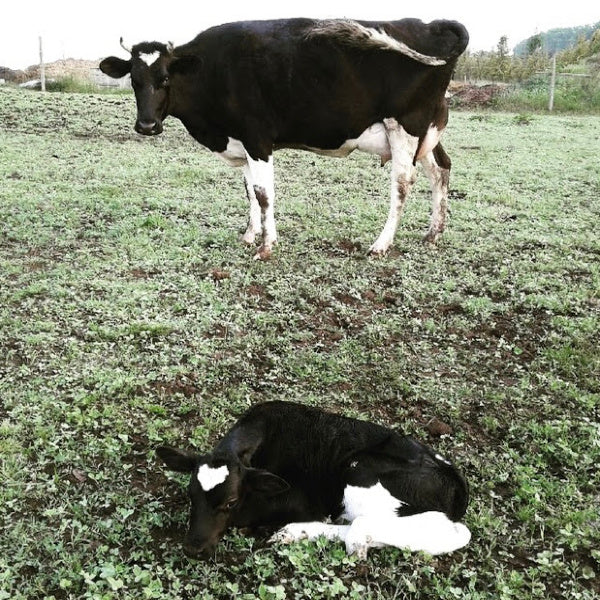All photography is courtesy of Goodale Farms
Hal Goodale describes himself as a personal farmer. Every week, the former millworker, who runs a 20-acre farm in Suffolk County, delivers fresh eggs, milk, several kinds of cheeses, meat, produce, and even artisanal soap to a select group of customers from Manhattan to Montauk.
He’s been running Goodale Farms, which has been in his family since the mid- 1800s, as a sustainable business in the town of Riverhead since 2005. Back then, he sold his products at farmers markets in Queens, Brooklyn, and Manhattan. But he soon realized he needed a new business model focused on loyal customers who shared his farm-to-table philosophy. He has long encouraged his customers to visit him on location to pick berries in the summer and feed the cows and goats, emphasizing the importance of knowing where their food comes from.
And now, with the coronavirus pandemic forcing people into a simpler, more sustainable way of life, Goodale, 50, has been as busy as ever. In this time of crisis, when grocery store shelves are shockingly empty, Goodale Farms is still serving some 200 families, who pay between $75 to $100 per week for deliveries to their doors. He says he has been inundated lately with calls from new clients, and relies on a close-knit circle of employees who help him carry out his daily routine on the farm. He has dispatched his youngest children, both teenagers, who are home from school to help with deliveries. His sister-in-law drives one of the trucks, his father helps with making jam, and a childhood friend works on the farm.

“If they’re not blood family, they’re family friends,” he said.
New York Makers spoke to Hal Goodale about spring on the farm and his views on the food industry in these challenging times.
New York Makers: How has your business changed during the current crisis?
Hal Goodale: On the farm it’s business as usual, but the increase in interest and the phone ringing with people requesting memberships, it’s gone up a lot. It’s a tricky balance. We have been working with marketing people to create a brand presence, to get as many members as we can, but clearly that doesn’t work because we can only take on so many without jeopardizing the quality. For me to get more milk, I either have to get more cows, or source it from a place I can trust. There’s a lot of companies now that do food delivery. They’re like brokers; they're more of a delivery service. But the meat and dairy we provide is from here. In the summertime the produce is from here, and in the winter I source the produce from a farm I trust. It’s not like we can go from 200 members to 500 members in a week. But in a month you might sign up 30 members and you might lose ten or fifteen. I compare it a lot to a diet. After a month, if it doesn’t work or they get tired of it, they stop. People want to eat better, but eating healthy takes work.
NYM: With spring in full bloom, how do your routines change on the farm?
HG: The spring comes on, and, for the goats, it’s birthing season. The goats start to give birth in March. They’ve been dry and now we’ve been milking them twice a day, plus feeding the babies, three to four times a day. We have 100 goats and they average about two babies each. It’s been much busier here the last two to three weeks. With the virus there’s been a huge interest in our program and more demand. We try to do a lot of our production now, making feta that goes in a brine. Once we get into the summer months, the demand for milk and fresh cheeses becomes a lot more.

NYM: You went into farming in 2005, with two cows, six goats, two pigs and 30 chickens. What were you doing before that? Did you grow up farming with your family?
HG: The family has been farming since the 1800s. I was in the construction industry, and I had a custom millwork company that I sold. I wanted to do something different, so I went into farming. When I started this, it was about providing quality foods for my kids. I have seen what goes on in the different industries, and what’s going on [with the pandemic] now is relevant to what it comes down to...having a source for local food that you know where it comes from. Knowing where it came from is important.

NYM: What are your thoughts on the food industry as a whole?
HG: You can buy organic, but it’s big companies, like Delmonte and Dole, that are also doing organic, and they are doing whatever they need to do to make sure it gets out there. Making profit is the bottom line; the quality or the safety or whatever comes second. People are used to that Driscoll berry; it looks perfect. But there’s something not right with it if it can last for a month. A fresh berry out of the field that has been ripened by the sun, you can’t compare the flavor. It’s like a tomato. They are picked green, they gas them to turn them red, and so they stay firm. There’s no flavor because they’ve never truly ripened.
NYM: Do you sell any other products? And do you have any Goodale Farm signatures, or favorites?
HG: On the dairy end, the feta, the yogurt, are very popular, along with the butter. They’re different. We don’t do anything to them and that’s the difference. You go to the store and see yogurt or milk. Milk is not supposed to have ingredients. It’s just milk. Our yogurt is plain. You take it, you put a little honey or some berries in it. I don’t use milk, I use the yogurt in my cereal. Most of our meat is popular, because it’s pasture-raised and it’s natural.




Leave a comment